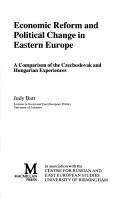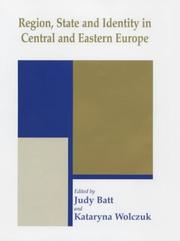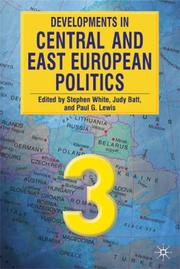| Listing 1 - 10 of 30 | << page >> |
Sort by
|

ISBN: 0333444566 Year: 1988 Publisher: London Macmillan
Abstract | Keywords | Export | Availability | Bookmark
 Loading...
Loading...Choose an application
- Reference Manager
- EndNote
- RefWorks (Direct export to RefWorks)
Book
ISBN: 0861870883 0861870875 Year: 1991 Publisher: London Royal Institute of International Affairs
Abstract | Keywords | Export | Availability | Bookmark
 Loading...
Loading...Choose an application
- Reference Manager
- EndNote
- RefWorks (Direct export to RefWorks)
Economic policy and planning (general) --- Eastern and Central Europe --- Czechoslovakia --- Hungary --- Poland --- Tchécoslovaquie --- Hongrie --- Pologne --- Economic policy --- Politics and government --- Politique économique --- Politique et gouvernement --- 338.24 (4-11) --- 815 Geschiedenis --- 830 Economie --- 838 Duurzame Ontwikkeling --- 841 Politiek Bestel --- 841.3 Politieke bewegingen --- 884.1 Oost-Europa --- europe de l'est --- reforme economique --- 330.540 --- 331.31 --- 331.32 --- CSR / Czechoslovakia - Tsjechoslowakije - Tchecoslovaquie --- EEU / Central & Eastern Europe --- HU / Hungary - Hongarije - Hongrie --- PL / Poland - Polen - Pologne --- Instrumenten van de economische politiek. Economische orde. Economisch politieke maatregelen. Stabilisering. Stimuleringsmaatregelen. Regulering. Financiele steunmaatregelen--Oost-Europa --- oost europa --- economische hervorming --- Socialistische stelsels: algemeenheden. --- Economisch beleid. --- Structuur van de economie. --- Geografie --- Sociale geografie --- Politieke Geografie. --- 338.24 (4-11) Instrumenten van de economische politiek. Economische orde. Economisch politieke maatregelen. Stabilisering. Stimuleringsmaatregelen. Regulering. Financiele steunmaatregelen--Oost-Europa --- Tchécoslovaquie --- Politique économique --- Socialistische stelsels: algemeenheden --- Economisch beleid --- Structuur van de economie
Book
Year: 2004 Publisher: Paris Western European union. Institute for security studies
Abstract | Keywords | Export | Availability | Bookmark
 Loading...
Loading...Choose an application
- Reference Manager
- EndNote
- RefWorks (Direct export to RefWorks)
Book
Year: 2005 Publisher: Paris European Union institute for security studies
Abstract | Keywords | Export | Availability | Bookmark
 Loading...
Loading...Choose an application
- Reference Manager
- EndNote
- RefWorks (Direct export to RefWorks)

ISBN: 0714652431 071468225X Year: 2002 Publisher: London Cass
Abstract | Keywords | Export | Availability | Bookmark
 Loading...
Loading...Choose an application
- Reference Manager
- EndNote
- RefWorks (Direct export to RefWorks)
Post-communist state transformations in Central and Eastern Europe have been accompanied by an upsurge of identity politics as newly-independent peoples sought to redefine themselves and their place in Europe. National unity has proved elusive in practice as new democracies have debated constitutional and territorial-administrative changes to prepare for the challenges of "returning to Europe" while at the same time integrating diverse historical regions and ethnic minorities. The case of regional reform and resurgent regional politics presented in this volume highlight the divergent concepts of statehood which have emerged as Central and East Europeans struggle to come to terms with the meaning of their statehood today. Competing models have been advocated in terms of their perceived conformity with national or local traditions and wider trends in modern European governance, but local interests and identities have challenged this emphasis on the imperatives of sovereignty, territorial unity and administrative efficiency. The contributors investigate these pressing issues as new and tougher controls are enforced at the EU's emerging external borders, posing fresh challenges to national, regional and minority identities.
National movements --- Eastern and Central Europe --- Regionalism --- Régionalisme --- Case studies. --- Cas, Études de --- Europe, Central --- Europe, Eastern --- Europe centrale --- Europe de l'Est --- Politics and government --- Politique et gouvernement --- Régionalisme --- Cas, Études de
Book
Year: 1999 Publisher: San Domenico di Fiesole European University Institute
Abstract | Keywords | Export | Availability | Bookmark
 Loading...
Loading...Choose an application
- Reference Manager
- EndNote
- RefWorks (Direct export to RefWorks)
Book
Year: 1999 Publisher: San Domenico di Fiesole Robert Schuman Centre
Abstract | Keywords | Export | Availability | Bookmark
 Loading...
Loading...Choose an application
- Reference Manager
- EndNote
- RefWorks (Direct export to RefWorks)
Book
Year: 2003 Volume: 64 Publisher: Paris : Institut d'études de sécurité de l'Union européenne,
Abstract | Keywords | Export | Availability | Bookmark
 Loading...
Loading...Choose an application
- Reference Manager
- EndNote
- RefWorks (Direct export to RefWorks)
Military policy --- Politique militaire --- European Union --- Membership. --- Europe --- Defenses --- Foreign relations --- Cooperation --- Défense --- Relations extérieures --- Coopération
Periodical
Abstract | Keywords | Export | Availability | Bookmark
 Loading...
Loading...Choose an application
- Reference Manager
- EndNote
- RefWorks (Direct export to RefWorks)

ISBN: 0333948785 0333948777 Year: 2003 Publisher: Basingstoke : Macmillan,
Abstract | Keywords | Export | Availability | Bookmark
 Loading...
Loading...Choose an application
- Reference Manager
- EndNote
- RefWorks (Direct export to RefWorks)
Post-communism --- Postcommunisme --- Europe, Eastern --- Europe, Central --- Europe de l'Est --- Europe centrale --- Politics and government --- Politique et gouvernement --- Democracy --- -#SBIB:328H27 --- Self-government --- Political science --- Equality --- Representative government and representation --- Republics --- Instellingen en beleid: Midden- en Centraal Europa: algemeen --- East Europe --- Eastern Europe --- -Democracy --- -Post-communism --- -Europe, Eastern
| Listing 1 - 10 of 30 | << page >> |
Sort by
|

 Search
Search Feedback
Feedback About UniCat
About UniCat  Help
Help News
News